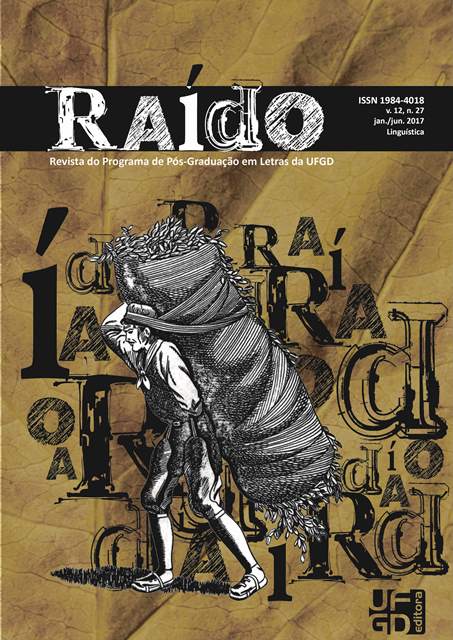Written practices in Biological Science teaching degree program: recontextualized academic literacies
DOI:
https://doi.org/10.30612/raido.v11i27.6751Keywords:
Academic Literacy, Identities in teaching, Biological Sciences, Pibid.Abstract
This article aims to analyze the students’ interactions in written academic literacies practices, in order to characterize how the transformations of teachers’identities occur. The methodological approach is qualitative, with the analyses of the speech of two PIBID participants, of a Biological Science Teaching Degree Program. The analysis is fulfilled by discourse markings in the subjects’ voice – in diary, interviews and evaluative seminars – as the indicative of the students’ role considering the new literacy practices. The theoretical basis finds contribution in the New Literacy Studies (STREET, 1995), with the approach in academic literacy (LEA; STREET, 1998, 2006; LILLIS, 1999, 2001, 2003; FIAD, 2011; FISCHER, 2007, 2010, 2015), considering value questions, identity and power of the social group. Besides that, the studies are focused in identities formation (BAUMAN, 2005; HALL, 2011, 2012) and in some aspects of bakhtinian theory (BAKHTIN, 2011). The analyses show the interactions ways in Pibid literacy practices, aiming to establish relations with written productions, accomplished by the subjects. The results demonstrate that the interaction in Elementary school’s classroom, allows the professional identity changes on being students to be a teacher.Downloads
Download data is not yet available.
Downloads
Published
2017-08-18
How to Cite
Fischer, A., & Colaço, S. F. (2017). Written practices in Biological Science teaching degree program: recontextualized academic literacies. Raído, 11(27), 438–462. https://doi.org/10.30612/raido.v11i27.6751
Issue
Section
PART IV - ACADEMIC WRITING WITHIN MULTIPLE CONTEXTS OF ACADEMIC FORMATION
License
Os autores devem aceitar as normas de publicação ao submeterem a revista, bem como, concordam com os seguintes termos:
(a) O Conselho Editorial se reserva ao direito de efetuar, nos originais, alterações da Língua portuguesa para se manter o padrão culto da língua, respeitando, porém, o estilo dos autores.
(b) Autores mantém os direitos autorais e concedem à revista o direito de primeira publicação, com o trabalho simultaneamente licenciado sob a Atribuição-NãoComercial-CompartilhaIgual 3.0 Brasil (CC BY-NC-SA 3.0 BR) que permite: Compartilhar — copiar e redistribuir o material em qualquer suporte ou formato e Adaptar — remixar, transformar, e criar a partir do material. A CC BY-NC-SA 3.0 BR considera os termos seguintes:
- Atribuição — Você deve dar o crédito apropriado, prover um link para a licença e indicar se mudanças foram feitas. Você deve fazê-lo em qualquer circunstância razoável, mas de nenhuma maneira que sugira que o licenciante apoia você ou o seu uso.
- NãoComercial — Você não pode usar o material para fins comerciais.
- CompartilhaIgual — Se você remixar, transformar, ou criar a partir do material, tem de distribuir as suas contribuições sob a mesma licença que o original.
- Sem restrições adicionais — Você não pode aplicar termos jurídicos ou medidas de caráter tecnológico que restrinjam legalmente outros de fazerem algo que a licença permita.
(c) Após a publicação, os autores têm permissão e são estimulados a publicar e distribuir seu trabalho online – em repositórios institucionais, página pessoal, rede social ou demais sites de divulgação científica, desde que a publicação não tenha fins comerciais.



